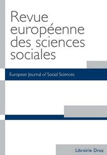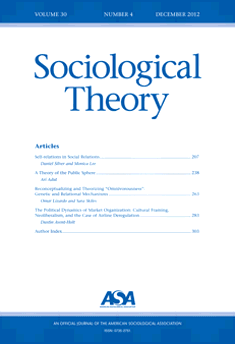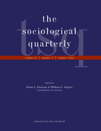
TIME & SOCIETY
Scope & Guideline
Navigating the Complexities of Time and Social Phenomena
Introduction
Aims and Scopes
- Exploration of Temporal Dynamics:
The journal investigates how time influences social behaviors, structures, and relationships, emphasizing the importance of temporal contexts in understanding societal issues. - Interdisciplinary Approaches:
TIME & SOCIETY welcomes contributions from various fields such as sociology, anthropology, political science, and environmental studies, fostering a rich dialogue across disciplines about the role of time. - Focus on Social Change and Justice:
The journal often addresses themes of social change, justice, and equity, examining how different temporalities affect marginalized communities and social movements. - Methodological Innovations:
A strong emphasis is placed on methodological advancements, particularly in analyzing temporalities through qualitative and quantitative methods, including ethnographic studies and time use research. - Critical Examination of Technology and Time:
The impact of technology on societal conceptions of time is a recurrent theme, exploring how digital advancements reshape our temporal experiences and governance.
Trending and Emerging
- Digital Temporalities:
There is an increasing focus on how digital technologies influence our perceptions and experiences of time, particularly in governance, communication, and social interactions. - Environmental Temporalities:
Research addressing the relationship between time and environmental issues, such as climate change and sustainability practices, is gaining traction, highlighting the urgency of temporal considerations in ecological contexts. - Youth and Temporal Constructs:
Emerging studies are exploring how youth engage with and construct their temporal identities, reflecting broader societal changes and challenges faced by younger generations. - Health and Wellbeing in Temporal Contexts:
The intersection of time with health and mental wellbeing is becoming a prominent theme, particularly in relation to the COVID-19 pandemic and its impact on time perception. - Queer Temporalities:
The exploration of queer temporalities and alternative futures is on the rise, emphasizing the need for diverse narratives and understandings of time within marginalized communities.
Declining or Waning
- Historical Temporalities:
Themes centered on historical comparisons and the analysis of past temporal constructs have seen a decline, suggesting a shift towards more contemporary issues and immediate temporalities. - Traditional Labor Studies:
Research focusing on conventional labor practices and time management in industrial contexts has reduced, indicating a possible move towards more flexible and remote work analyses. - Static Temporal Models:
There is a noticeable decrease in studies employing static models of time, as the journal increasingly favors dynamic and relational approaches to temporality. - Linear Time Perspectives:
The traditional linear perspectives on time are becoming less prevalent, as more researchers explore cyclical and relational understandings of temporality. - Focus on Singular Events:
Research centered on isolated historical events or singular time periods is waning, with a growing interest in broader, systemic temporalities and their implications.
Similar Journals

SOCIOLOGICAL PERSPECTIVES
Challenging paradigms, enriching perspectives in sociology.Sociological Perspectives is a premier academic journal published by SAGE Publications Inc that serves as a vital platform for the dissemination of high-quality research in the fields of sociology and political science. Established in 1958, the journal has become a crucial resource for scholars, professionals, and students alike, actively contributing to the evolution of sociological thought and understanding. With its robust Q1 quartile ranking in both Sociology and Political Science as of 2023, it stands at the forefront of academic discourse, fostering interdisciplinary dialogue and innovative perspectives. Dedicated to ensuring academic rigor and relevance, the journal prioritizes articles that address contemporary social issues, theoretical advancements, and methodological innovations. While currently not offering Open Access, it remains accessible through various institutional subscriptions, enriching the academic community with insights that challenge conventional paradigms and encourage thoughtful engagement with emerging social phenomena. Situated in the heart of the United States, specifically at 2455 Teller Rd, Thousand Oaks, CA 91320, Sociological Perspectives continues to shape the future of sociological inquiry and influence policy and practice.

SOCIAL SCIENCE RESEARCH
Empowering Voices Through Quality Research and DialogueSOCIAL SCIENCE RESEARCH is a leading academic journal published by Academic Press Inc. Elsevier Science, dedicated to advancing knowledge in the fields of sociology, political science, and education. With an impressive Impact Factor reflecting its esteemed reputation, the journal consistently ranks in the Q1 category for both education and sociology/political science, placing it among the top in its field. The journal serves as an essential platform for high-quality research, facilitating discourse among scholars, practitioners, and students alike. By publishing innovative studies that span theoretical, empirical, and methodological approaches, SOCIAL SCIENCE RESEARCH contributes significantly to our understanding of social phenomena. Positioned within the competitive landscape of social sciences, it holds a Scopus Rank that highlights its influence, with a percentile ranking of 82nd in sociology and political science. With its commitment to fostering impactful scholarship, this journal is an invaluable resource for those seeking to deepen their engagement with the social sciences. Contributions are peer-reviewed to ensure the highest standards of academic rigor and relevance.

TELOS-Revista de Estudios Interdisciplinarios en Ciencias Sociales
Connecting Ideas, Enriching UnderstandingTELOS-Revista de Estudios Interdisciplinarios en Ciencias Sociales is a prominent journal dedicated to the field of interdisciplinary social sciences, published by the Universidad Dr. Rafael Belloso Chacín. With an Open Access policy since its inception in 1999, TELOS aims to expand the dissemination of knowledge and promote global dialogue among researchers, professionals, and students alike. This journal serves as a platform for innovative research that transcends traditional boundaries, encouraging multifaceted approaches to contemporary social issues. Although specific metrics such as the H-index and Scopus rankings are not listed, its commitment to open access and interdisciplinary collaboration positions TELOS as an important resource within the academic community. The journal aspires to foster a deeper understanding of societal dynamics and contribute valuable insights into the challenges faced by modern societies.

Revista Critica de Ciencias Sociais
Exploring diverse perspectives in the social sciences landscape.Revista Critica de Ciencias Sociais is a distinguished journal published by the CENTRO ESTUDOS SOCIAIS, FAC ECONOMIA, dedicated to advancing the field of social sciences. Established in 2001 and embracing Open Access since 2002, this journal aims to provide an inclusive platform for scholarly research in various areas of psychology and social sciences. With a notable commitment to quality and accessibility, it currently holds a Q4 category ranking in both psychology and general social sciences as of 2023. Despite its emerging status, with rankings reflecting its growth in the competitive landscape, this journal aspires to elevate discussions and disseminate knowledge pertinent to contemporary societal issues. Based in Coimbra, Portugal, the journal serves as an invaluable resource for researchers, professionals, and students alike, fostering a global dialogue that enriches the multifaceted field of social studies.

SOCIAL RESEARCH
Pioneering research that shapes our understanding of society.SOCIAL RESEARCH, published by Johns Hopkins University Press, is a distinguished journal that has been integral to the discourse in the social sciences since its inception in 1946. With an ISSN of 0037-783X, this journal encapsulates a diverse range of scholarly articles and research findings, making significant contributions to fields such as Cultural Studies, History, Philosophy, Political Science, and Sociology. Its impressive impact factor showcases its credibility and relevance, while its current category rankings highlight its strong positioning, particularly as a Q1 journal in History and Q2 in Cultural Studies. Although not an Open Access publication, readers can access a wealth of knowledge that spans across pivotal years and topics, encouraging a deeper understanding and critical engagement with contemporary social issues. By bridging theoretical and empirical research, SOCIAL RESEARCH remains an essential resource for researchers, professionals, and students striving to advance their knowledge and impact within the social sciences.

Revue Europeenne des Sciences Sociales
Nurturing Academic Discourse in the Heart of EuropeRevue Europeenne des Sciences Sociales, published by LIBRAIRIE DROZ SA, is a vital platform in the field of social sciences, offering a distinct focus on European social research and interdisciplinary studies. The journal, with ISSN 0048-8046 and E-ISSN 1663-4446, has been a valuable resource since its inception, covering significant themes and fostering on-going discussions in European social contexts. Although indexed coverage in Scopus has been discontinued since 2016, the journal maintains its scholarly importance, aiming to present rigorous analyses and innovative perspectives that stimulate academic discourse and contribute to a more profound understanding of social phenomena. Researchers, professionals, and students alike are encouraged to explore the journal for its rich insights and comprehensive studies that reflect the complexities of contemporary European societies.

SOCIOLOGICAL THEORY
Challenging paradigms to redefine the landscape of sociology.Sociological Theory, published by SAGE Publications Inc, is a premier journal dedicated to advancing the field of sociology through innovative theoretical approaches and empirical research. With an impressive impact factor and recognized as a Q1 journal in both Sociology and Political Science, it ranks 86 out of 1466 in its category, placing it in the 94th percentile according to Scopus metrics. This journal seeks to foster rigorous debate and insight on contemporary sociological issues, welcoming contributions that challenge existing paradigms and offer new perspectives. Founded in 1996, Sociological Theory continues to push the boundaries of sociological inquiry through its commitment to quality and relevance, making it an essential resource for researchers, professionals, and students alike. Based in the United Kingdom, this journal is not an open-access publication, but it remains widely accessible through institutional subscriptions, ensuring that its valuable content reaches a global audience interested in the dynamics of social life.

SOCIOLOGICAL QUARTERLY
Fostering Critical Discourse in Social SciencesSociological Quarterly, published by Taylor & Francis Inc, stands as a leading journal in the field of sociology and political science, providing a platform for innovative research and critical discourse since its inception in 1960. With an impressive impact factor reflected by its Q2 categorization in the 2023 rankings, this journal has effectively positioned itself as a crucial resource for scholars and practitioners alike. Operating under the ISSN 0038-0253 and E-ISSN 1533-8525, the journal is committed to advancing knowledge and fostering scholarly communication within the social sciences, evidenced by its robust Scopus ranking of 392 out of 1466 and a commendable 73rd percentile. Although it does not currently offer open access, Sociological Quarterly remains an essential publication for those seeking to engage with contemporary sociological issues and to contribute to the vibrant dialogue shaping our understanding of society.

Sri Lanka Journal of Social Sciences
Fostering Scholarly Dialogue on Global IssuesThe Sri Lanka Journal of Social Sciences, an esteemed publication of the NATL SCIENCE FOUNDATION SRI LANKA, serves as a vital platform for disseminating research across the diverse and dynamic field of social sciences. Established in 1978, this journal has continuously contributed to the academic landscape by publishing scholarly work that addresses regional and global social issues. With an ISSN of 0258-9710 and an E-ISSN of 2478-1169, the journal is recognized for its contributions within the Q4 category in Social Sciences (miscellaneous) as of 2023. Despite its recent Scopus ranking of 211/275, it offers researchers, professionals, and students an opportunity to engage with critical social science inquiries. Although it lacks an open access model, the journal provides a subscription-based route to access its valuable content, focusing on understanding and resolving social complexities within and beyond Sri Lanka. This commitment to scholarly excellence positions the journal as an important resource for those dedicated to advancing social knowledge and practice.

Papeles de Trabajo
Empowering knowledge in the social sciences, one paper at a time.Papeles de Trabajo, published by the Universidad Nacional San Martín, Instituto Altos Estudios Sociales (IDAES), is a prominent open access journal dedicated to advancing knowledge in the field of social sciences. Since its inception in 2007, the journal has provided a platform for researchers, professionals, and students to disseminate their findings and explore critical issues impacting contemporary society. With an ISSN of 1851-2577, Papeles de Trabajo is committed to fostering academic discourse by making scholarly research accessible to a broader audience. The journal not only encourages submissions that span various areas within the social sciences but also emphasizes the importance of innovative methodologies and interdisciplinary perspectives. Located in Buenos Aires, Argentina, it aims to elevate local research while engaging with global academic conversations. Researchers and practitioners seeking to contribute to or stay updated on significant developments in the field will find Papeles de Trabajo an invaluable resource.